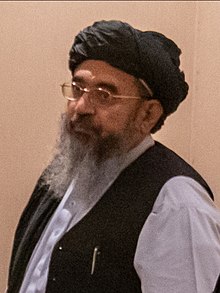Abdul Hakim Haqqani
Abdul Hakim Haqqani | |
|---|---|
عبد الحكيم حقاني | |
 Abdul Hakim Haqqani in 2020 | |
| Chief Justice of Afghanistan | |
| Assumed office 15 August 2021 | |
| Deputy |
|
| Supreme Leader | Hibatullah Akhundzada |
| Preceded by | Sayed Yousuf Halim |
| In exile 25 May 2016 – 15 August 2021 | |
| Supreme Leader | Hibatullah Akhundzada |
| Preceded by | Hibatullah Akhundzada |
| Judge of the Kandahar Primary Court | |
| In office c. 1995–c. 2001 | |
| Supreme Leader | Mullah Omar |
| Personal details | |
| Born | 1967 Panjwayi, Kandahar Province, Kingdom of Afghanistan |
| Education | Darul Uloom Haqqania |
| Profession | Politician, writer |
| Political affiliation | Taliban |
Abdul Hakim Haqqani (Pashto: عبد الحكيم حقاني Pashto pronunciation: [ˈabdʊl haˈkim haqɑˈni]; born 1967), also known as Abdul Hakim Ishaqzai (Pashto: عبد الحكيم اسحاقزى Pashto pronunciation: [ˈabdʊl haˈkim ɪshaqˈzai]),[1][2][3] is an Afghan Islamic scholar and writer who has been the chief justice of Afghanistan since 2021 in the internationally unrecognized Taliban regime.[4] He has also served as chief justice of the Supreme Court in the 1996–2001 Islamic Emirate of Afghanistan. He was the chairman of the Taliban negotiation team in the Qatar office. He is one of the founding members of the Taliban and was a close associate of the late leader Mullah Mohammed Omar.[5][6]
Early life
[edit]He was born to Mawlawi Khudaidad in 1967 in the Panjwayi District of Kandahar Province, Afghanistan. He graduated from Darul Uloom Haqqania, a Deobandi Islamic seminary (darul uloom), in Pakistan, and taught there.[6]
Career
[edit]Teaching
[edit]Apart from teaching at the Darul Uloom Haqqania, until recently he also ran his own Islamic seminary or madrasa in the Ishaqabad area of Quetta, in Pakistan’s Balochistan province.[6]
Judiciary
[edit]During the rule of the first Islamic Emirate, in addition to teaching, he also served in the Appellate Court and at the Central Dar ul-Ifta. Following the appointment of Hibatullah Akhundzada as Supreme Leader, Ishaqzai was appointed Chief Justice.[7]
Diplomacy
[edit]In September 2020, he was appointed the Taliban's chief negotiator for peace talks in Qatar with the government of Afghanistan, replacing Sher Mohammad Abbas Stanikzai, who became his deputy in the 21-member negotiating team.[8]
Controversies
[edit]International sanctions due to alleged violation of women's rights
[edit]On 20 July 2023, Hakim Haqqani was sanctioned by the EU due to his instrumental role as Chief Justice of the Supreme Court in implementing policies and spreading ideological teachings aimed at creating and justifying gender-based repressions against women in Afghanistan.[9]
Books
[edit]Specializing in Islamic jurisprudence, especially its justice system, Hakim Haqqani has written books on various subjects which have been translated into many languages.[10]
References
[edit]- ^ "Factbox: Taliban announces makeup of new Afghan government". Reuters. 7 September 2021. Retrieved 12 September 2021.
- ^ "Major reshuffle in Taliban leadership ahead of intra-Afghan dialogue". Zee News. 8 September 2020. Retrieved 12 September 2021.
- ^ "Taliban's government includes designated terrorists, ex-Guantanamo detainees | FDD's Long War Journal". www.longwarjournal.org. 8 September 2021. Retrieved 12 September 2021.
- ^ احمدزى, محمد اصف (28 October 2021). "مولوي عبدالحکيم د سترې محکمې د رئیس او مولوي فريدالدين د علومو اکاډمي د رئيس په توګه ټاکل شوي".
- ^ "Ishaqzai, Abdul Hakim Mawlawi Sheikh".
- ^ a b c Bezhan, Frud (10 September 2020). "Why Did the Taliban Appoint a Hard-Line Chief Negotiator for Intra-Afghan Talks?". Radio Free Europe/Radio Liberty.
- ^ "Brief Introduction of Members of the Negotiating Team of the Islamic Emirate of Afghanistan – Islamic Emirate of Afghanistan". Archived from the original on 18 August 2021.
- ^ Shadi Khan Saif (5 September 2020). "Taliban picks team for talks with Afghan government". Anadolu Agency. Retrieved 24 August 2021.
- ^ "L183 I". Official Journal of the European Union.
- ^ Yousafzai, Shahabullah (15 October 2021). "Abdul Hakim Haqqani appointed Afghanistan's chief justice". The Express Tribune.
